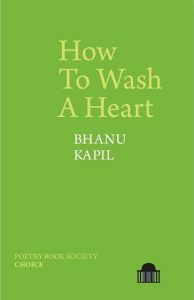How to Wash a Heart
Written against but within the context of an emerging fortress Europe, the philosopher Jacques Derrida wrote in Of Hospitality that ‘absolute hospitality’ seeks no conditions but ‘requires that I open up my home’ to ‘the foreigner’ and let them arrive and ‘take place in the place I offer them, without asking… either reciprocity (entering into a pact) or even their names’. Such a practice might be impossible but it shouldn’t prevent us from shaping our more transactional everyday acts with that ethical threshold in mind.
How to Wash a Heart probes the relationship between a citizen host and her immigrant guest which sours despite initial, ostensible good intentions. Bhanu Kapil asks unsettling and uncomfortable questions about how the host frames her conditional hospitality: by demanding that the guest narrates and beautifies ‘collective trauma’ thus earning pity; by turning the guest into an exoticized pet; or by casting the guest as an other for the exclusive gratification and complaint of the host:
The messages we received
Were as follows:
You are a sexual object, I have a right
To sexualize you.
You are not an individual.
You are here
For my entertainment,
You complain too much.
Your sexual identity is not important.
Thus relationship between host and guest detailed here is abusive, with the latter living under the pressure of ‘constant surveillance’, ever watchful not to be caught ‘off guard’ disturbing the host’s ‘wealth and property’, and forever responding to the former’s whims. But its logic is not altogther uncommon.
Underpinning this claustrophobic, downward spiral of relations is a seam of corporeal imagery used to good effect: being devoured (‘eat me bones and all’); the smells of the flesh wherein the ‘host’s gleaming hair’, shampooed to perfection, is contrasted with the guest’s bodily odours. Thus in one acerbically and satirically comic section, the hosts says,
I can smell your body
Odor.
I can small your vagina.
Are you wearing your genitals
As a brooch?
to which the unwelcomed guest observes, ‘this is what is meant/by the gift of a douche/And the yellow bottle/Of medicated powder’.
The heart of the title is no abstract concept in this collection but a live organ carved from the body, signifying acts of violation and real physical vulnerability. Blows are felt in and on the body as much in the mind; the knock at the door by the officer from the ‘Department of Repatriation’ is a
… a knock on my eye.
… a hand on my fire,
… a break in the scream.
The scream is mine.
Kapil’s use of first and second person is intriguing, and may have been the result of the collection’s first outing as an ICA performance of the same name. The direct address of an ‘I’ to a ‘you’, infuses How to Wash a Heart with a powerful metaphysics of presence. Coupled with short and punchy syntax, full of present tense verbs, in assertions or imagined speech, the sparseness of the poems pack a real punch. Performative traces are present also in deliberate syntactical echoes, some incantatory, and in vowel similarities and repetitions, yet the poems’ surreal juxtapositions strike a different more writerly tenor. There is a host of literary and popular cultural references. Displacement and flight are also echoed in recollections of Partition, giving rise to some lovely lyrical lines:
What happens to the memory
Of other languages,
Carried in the body as poetry[…]
I wanted more such lines, but I also thought in alarm, would this amount to asking for beautified trauma? The real world, riven and driven by harmful, brutal enactments of institutionalized power, often gives us little space to dream and imagine complexity in enforcement or in resistance. In a volume that relies on dramatized persona (albeit allegorized), I found myself wanting also to have the host unpacked. How should literature as an imagined space proceed given its ethical responsibilities? I don’t have answers. How to Wash a Heart with its urgent salutory lessons about ways in which immigrants are unhoused and unmade punches above its weight of 44 pages, yet as a guest reader in this poetic home of words, there was less room to roam than I desired.


Leave a Reply